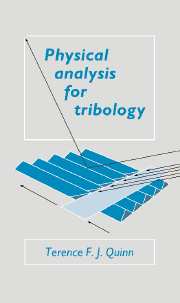Book contents
- Frontmatter
- Contents
- Preface
- Nomenclature list
- 1 Tribology
- 2 Macroscopic physical techniques
- 3 Microscopic physical techniques for studying atomic arrangement
- 4 Microscopic techniques for studying atomic structure
- 5 The analysis of lubricant films
- 6 The analysis of surface temperatures in tribo-systems
- 7 The analysis of pitting failures in tribo-systems
- 8 The analysis of oxidational wear in tribo-systems
- 9 The application of physical techniques to selected ceramic tribo-systems
- References
- Index
1 - Tribology
Published online by Cambridge University Press: 29 October 2009
- Frontmatter
- Contents
- Preface
- Nomenclature list
- 1 Tribology
- 2 Macroscopic physical techniques
- 3 Microscopic physical techniques for studying atomic arrangement
- 4 Microscopic techniques for studying atomic structure
- 5 The analysis of lubricant films
- 6 The analysis of surface temperatures in tribo-systems
- 7 The analysis of pitting failures in tribo-systems
- 8 The analysis of oxidational wear in tribo-systems
- 9 The application of physical techniques to selected ceramic tribo-systems
- References
- Index
Summary
Definitions of common tribological terms
Tribology
Tribology is a new word based on the Greek word ‘tribo’, which means ‘rubbing’. Hence tribology is the ‘study of rubbing’. The word was first used by a British Government committee (chaired by Dr Peter Jost and hence known as the ‘Jost Committee’) that produced a report, in 1966, calling for increased education and research into a subject that was estimated (at 1966 prices) to be costing the United Kingdom about £300 million per year.
The Jost Committee defined tribology as ‘the study of the science and technology of interacting surfaces in relative motion’. It was hoped that the new word might provide the basis of a more unified approach to subjects previously studied separately under titles such as ‘friction’, ‘adhesion’, ‘lubrication’ and ‘wear’. It is indeed unfortunate that, to date, the Jost Committee's awareness of the need for a more unified (that is, interdisciplinary) approach has not been shared by many tribologists. This resistance to the calls for a change in our partisan approaches to the subject is illustrated quite neatly by the fact that it has taken nearly 20 years for the Journal of Lubrication Technology (JOLT) to change its name to the Journal of Tribology (JOT), namely from 1966 to 1985.
- Type
- Chapter
- Information
- Physical Analysis for Tribology , pp. 1 - 34Publisher: Cambridge University PressPrint publication year: 1991



